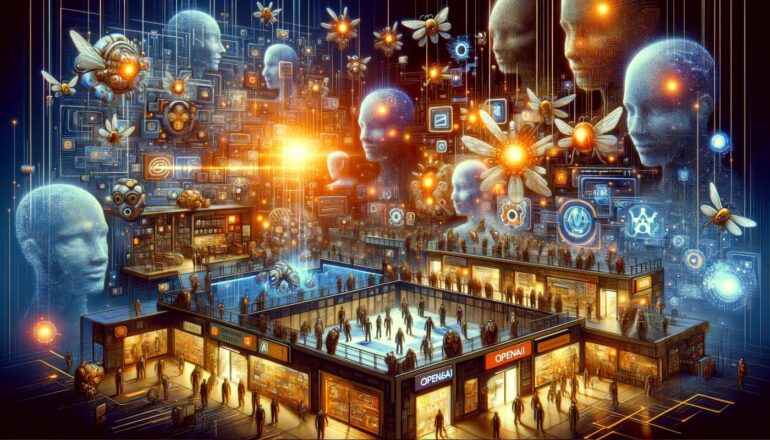TL;DR:
- OpenAI introduces the GPT Store, a marketplace for custom chatbot apps powered by GPT-4 and DALL-E 3.
- The store offers a variety of GPTs developed by OpenAI partners and the developer community.
- Access to the GPT Store is granted through OpenAI’s premium ChatGPT plans.
- GPTs in the store, like trail recommender and code tutor, are currently available for free.
- Developers can create GPTs using the user-friendly GPT Builder tool.
- GPTs can be tailored to perform tasks from answering recipe questions to generating code.
- GPTs listed in the store undergo a review process to ensure compliance with OpenAI’s terms.
- A “GPT builder revenue program” for developers is set to launch, based on user engagement.
- Delays in the GPT Store launch were linked to leadership changes at OpenAI.
Main AI News:
OpenAI has taken a significant step in the world of AI by introducing the GPT Store, a marketplace dedicated to GPTs and custom chatbot applications driven by their text and image-generating AI models, such as GPT-4 and DALL-E 3. This strategic move, announced during OpenAI’s first annual developer conference, DevDay, marks a pivotal moment in the AI industry.
The GPT Store, accessible through a dedicated tab in the ChatGPT client on the web, offers a diverse selection of GPTs. These chatbots are the result of collaborative efforts between OpenAI’s partners and the broader developer community. Users can explore the GPT Store’s offerings via the community leaderboard, which categorizes GPTs into areas like lifestyle, writing, research, programming, and education.
To gain access to the GPT Store, users must subscribe to one of OpenAI’s premium ChatGPT plans, including ChatGPT Plus, ChatGPT Enterprise, or the recently launched ChatGPT Team package.
A variety of GPTs have debuted at the store’s launch, including a trail recommender from AllTrails, a code tutor from Khan Academy, and a content designer from Canva. Notably, these GPTs are available for free use, at least initially, with future monetization strategies yet to be revealed.
What sets the GPT Store apart is its user-friendly approach to building GPTs. Developers, regardless of their coding experience, can define their GPTs’ capabilities in plain language. OpenAI’s GPT Builder tool then takes these inputs and strives to create AI-powered chatbots that fulfill those functions.
For instance, a GPT can be trained on a collection of cookbooks to provide answers regarding specific recipes and their ingredients. Alternatively, it could ingest a company’s proprietary codebases, enabling developers to assess coding styles or generate code adhering to industry best practices.
To list GPTs in the GPT Store, developers are required to verify their user profiles and submit their creations through OpenAI’s new review system. This system, a combination of human and automated review processes, ensures that GPTs align with the company’s terms of use. Additionally, users have the option to report any GPTs that violate these guidelines.
However, concerns regarding OpenAI’s moderation practices have arisen, given the company’s history of engaging low-paid contractors in the developing world. Questions about the compensation and access to mental health resources for the reviewers remain unanswered as of now.
In its initial phase, developers will not have the option to charge for their GPTs. Nevertheless, OpenAI plans to launch a “GPT builder revenue program” in the first quarter of the year, providing U.S. builders with income opportunities based on “user engagement” with their GPTs. Specific criteria for these payments will be disclosed at a later date.
The launch of the GPT Store was initially scheduled for last year but faced delays, likely due to a leadership shakeup in November. Despite the uncertainty, the GPT Store represents a significant step towards democratizing generative AI app development, potentially disrupting consultancies that specialize in creating GPT-like solutions for clients. The impact of this transformation remains to be seen, but it undoubtedly paves the way for a new era in AI innovation and accessibility.
Conclusion:
OpenAI’s GPT Store marks a significant shift in the AI market, democratizing AI app development and potentially challenging traditional consultancies specializing in similar solutions. The store’s free offerings and upcoming revenue program for developers are poised to reshape how businesses utilize AI-powered chatbots, opening new doors for innovation and accessibility.

